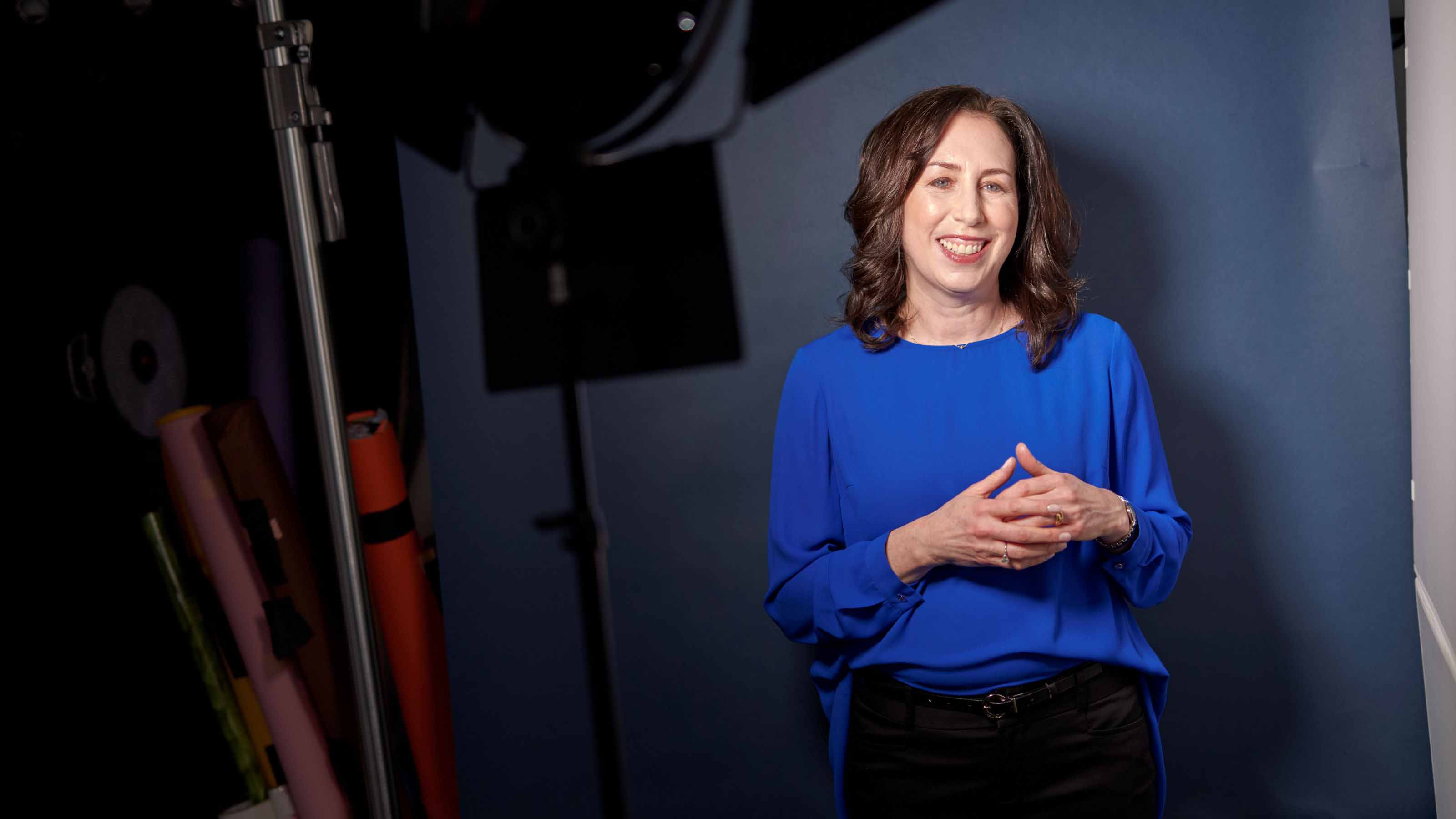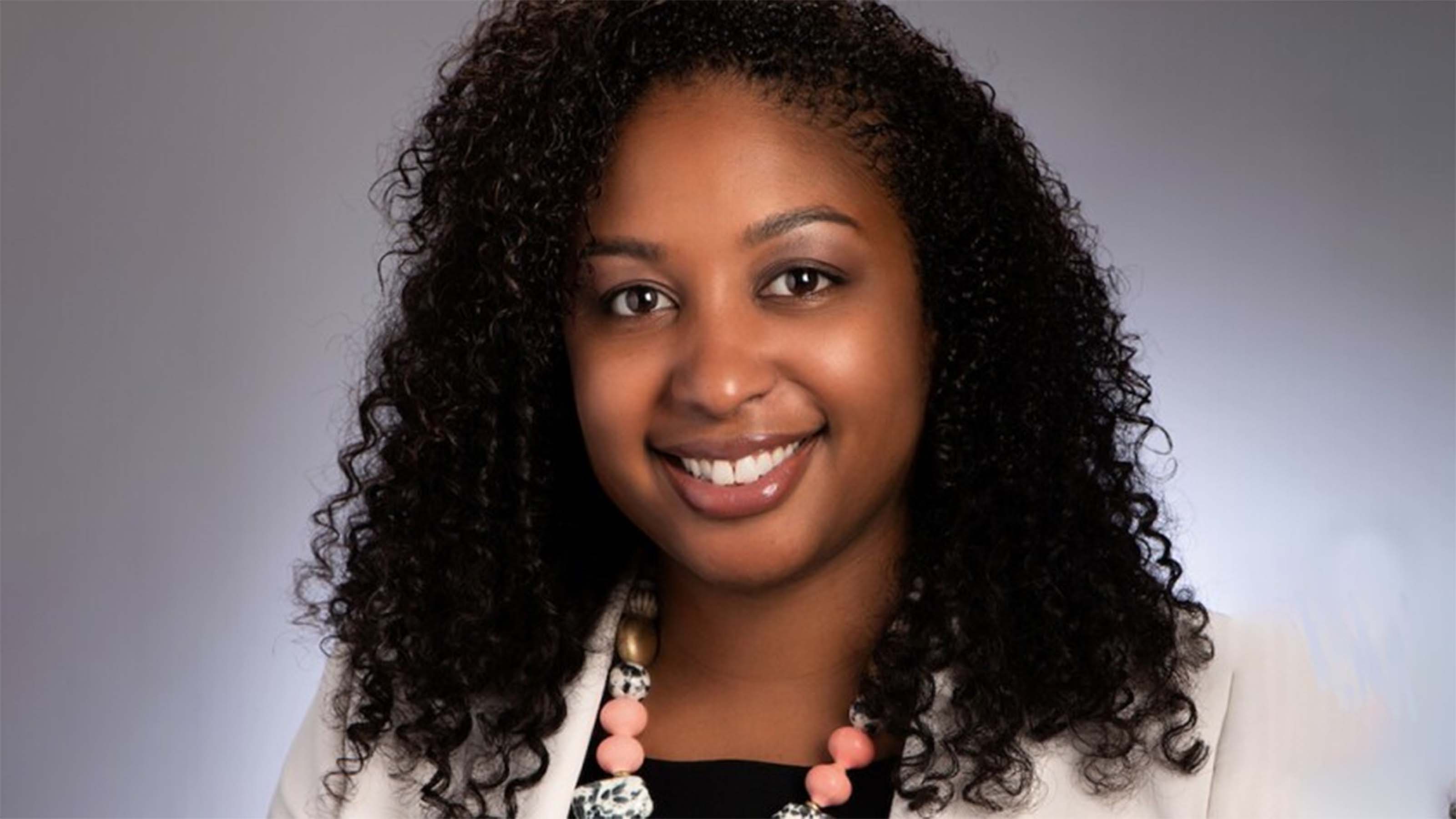Financial Challenges Affecting the LGBTQ Community
Our podcast hosts Ryan Ermey and Sandy Block talk with financial coach Cait Howerton about the unique set of financial issues facing those in the LGBTQ community. Plus: The pair discuss why you should stop procrastinating and get your REAL ID driver's license now.
Profit and prosper with the best of Kiplinger's advice on investing, taxes, retirement, personal finance and much more. Delivered daily. Enter your email in the box and click Sign Me Up.
You are now subscribed
Your newsletter sign-up was successful
Want to add more newsletters?

Delivered daily
Kiplinger Today
Profit and prosper with the best of Kiplinger's advice on investing, taxes, retirement, personal finance and much more delivered daily. Smart money moves start here.

Sent five days a week
Kiplinger A Step Ahead
Get practical help to make better financial decisions in your everyday life, from spending to savings on top deals.

Delivered daily
Kiplinger Closing Bell
Get today's biggest financial and investing headlines delivered to your inbox every day the U.S. stock market is open.

Sent twice a week
Kiplinger Adviser Intel
Financial pros across the country share best practices and fresh tactics to preserve and grow your wealth.

Delivered weekly
Kiplinger Tax Tips
Trim your federal and state tax bills with practical tax-planning and tax-cutting strategies.

Sent twice a week
Kiplinger Retirement Tips
Your twice-a-week guide to planning and enjoying a financially secure and richly rewarding retirement

Sent bimonthly.
Kiplinger Adviser Angle
Insights for advisers, wealth managers and other financial professionals.

Sent twice a week
Kiplinger Investing Weekly
Your twice-a-week roundup of promising stocks, funds, companies and industries you should consider, ones you should avoid, and why.

Sent weekly for six weeks
Kiplinger Invest for Retirement
Your step-by-step six-part series on how to invest for retirement, from devising a successful strategy to exactly which investments to choose.
Ryan Ermey: In theory, money matters such as saving, borrowing and investing and the advice surrounding them should be the same for everybody, but in practice the financial world is different for people in the LGBTQ community. People like me and like our guest Cait Howerton who joins the show for a conversation on finances for queer folks. On today's show, Sandy and I tell you why you need to get your REAL ID driver's license ASAP, and I explained the difference between risk tolerance and risk capacity. That's all ahead on this episode of Your Money's Worth. Stick around.
- Episode Length: 00:26:49
- Links and resources mentioned in this episode
- SUBSCRIBE: Apple Google Play Spotify Overcast RSS
Ryan Ermey: Welcome to Your Money's Worth. I'm Kiplinger's associate editor Ryan Ermey, joined as always by senior editor Sandy Block and we usually try to keep things pretty timely on this podcast. We want you to listen to the show and go act, but today we're talking about something that's happening a year from now, but we think that given you lead time is important on this. What are we talking about, Sandy?
Sandy Block: That's right, we're talking about REAL ID and it actually dates back to 2005 after the 9/11 terrorist attacks, Congress decided that, you know, we use our driver's license as the main form of ID. Congress decided they wanted a uniform driver's license to improve security because obviously there's a lot of concerns about people getting on planes. So states were instructed to adopt this new standard for driver's license. All these years later and it becomes official one year from now, October 2020 -- it's been a really bumpy ride. Some states resisted the idea because they think it's like federal over reach. Other states had a bunch of people show up at the DMV thinking they got their REAL ID and then they got notices saying, "Oh sorry, come back." And I can't think of anything worse than going to the DMV twice. Years ago in D.C., way before all this happened, I spent the whole day in a D.C. DMV, ended up with the driver's license that said "Snaydra Block" and I decided I'd rather change my name then go back to DMV.
From just $107.88 $24.99 for Kiplinger Personal Finance
Become a smarter, better informed investor. Subscribe from just $107.88 $24.99, plus get up to 4 Special Issues

Sign up for Kiplinger’s Free Newsletters
Profit and prosper with the best of expert advice on investing, taxes, retirement, personal finance and more - straight to your e-mail.
Profit and prosper with the best of expert advice - straight to your e-mail.
Sandy Block: But that's not going to happen anymore. You really have to get this right. So our advice is if you don't have REAL ID... and in most States it means you'll have a little star at the top of your driver's license. But if you don't have it, don't wait to get it because they're going to be big long lines at the DMV as this requirement gets closer. I just saw a story this week that 90% of Minnesotans do not have real ID and that's partly because Minnesota didn't get on this until 2017. So there's going to be big crowds at the DMV, so don't wait until summer or fall to get this. The other advice, and this is if you don't drive or you just can't even bear this thought, is a passport is a perfectly valid way to get on and so get a passport, make sure the passport that you already have is up to date, don't let it expire and then you don't really have to worry about it.
Sandy Block: And a passport is a good thing to have anyway. You want to go to Canada or Mexico or something. But keep an eye on this, as I said. I can't think of many things worse than having to go to the DMV twice. Go to your state and find out what documents you need before you go. One of our colleagues, her mother had to go twice because she got divorced and changed her name and they required that she bring in her divorce agreement. So it's really important to know what you need before you go in. Again, what we're trying to do here is prevent you from having to go to the DMV twice or not being able to get on a plane. So that's our advice for the day.
Ryan Ermey: Yeah. Well and the passport is not as tricky as it sounds. You can get your pictures taken at a CVS and bring it in-
Sandy Block: Well, and FedEx just recently reached an agreement with one of the passport providers where they will process it and for a lot of money they'll process it fast. And the good thing about the passport is nothing has changed, the rules for that are federal. So you know what you need when you go in and what's going to-
Ryan Ermey: That's already federally accepted ID everywhere.
Sandy Block: Yeah. Right. So, I think it's a good idea to have a passport anyway. But if you have any doubts about whether your driver's license is valid, this is a good work around.
Ryan Ermey: Alright. So you heard it here, make sure that you have your documents in order now, so that you don't have to spend all day at the DMV a year from now.
Ryan Ermey: After the break, financial coach Cait Howerton gives advice for the LGBTQ community. Don't go anywhere.
Ryan Ermey: We're back and we're here with Cait Howerton, who is a financial coach. She's a CFP candidate, a recipient of the FPA Diversity award. And we're here to talk about a topic that's very near and dear to my heart as a gay person, finances for LGBTQ, for queer people. So Cait, thank you so much for coming on.
Cait Howerton: Yeah, absolutely. Thank you so much for having me.
Ryan Ermey: So just to get started, tell us a little bit about yourself. How did you get into this line of work when it comes to financial coaching and focusing on the LGBT community?
Cait Howerton: Yeah, so I got into this line of work in my mid-twenties, I had quite a few friends who had a ton of financial questions. I had finished my MBA in September of 2014 and they were like, "Yeah, Cait, you must be the perfect person to talk to about this stuff because you know about business and money, right?"
Ryan Ermey: Sure.
Cait Howerton: Yeah. So, I found that I was answering a lot of questions about personal finance already. And as I started kind of navigating the field of adult finances, especially as a member of the LGBTQ community, I was like, "Wow, what are we doing? How do we... what are you supposed to do with your 401(k) and what is this life insurance bit?" I saw that I had a natural knack for personal finances and more importantly, I wanted to understand why do we do the silly things that we do with our money. So I found the AMCP and I completed my certified financial counselor certification. So I wanted to really understand what are the ways that we can help people with cashflow, with debt pay off, so on and so forth. But I also wanted to understand what are some of the behavioral issues around our money.
Cait Howerton: From there, kind of just progressed forward, became a financial coach. I started on the path of pursuing my certified financial planning certification and now currently I work as a professional financial coach, 40, 50 hours a week. This is what I do full-time, is helping people figure out how to get their money right.
Cait Howerton: Yeah, that's actually something that I've talked about quite a bit is because if you're from the rural South, it's fairly difficult to stay in your hometown due to acceptance and overall even just tolerance. And so you'll find, at least for within my experience as a queer person, that you want to navigate to somewhere that's more progressive and typically those city centers and larger metropolitan areas are where you wind up. And as far as like how to be able to afford those things and how you cope with that, the reality is a lot of queer people cope with it in really negligible ways. Whether it be relationships, drugs, alcohol, food, so forth, the things that we typically do to cope. But I would say a more healthy option with that would be to find supportive friendships, hopefully to find a roommate or if you're in a relationship and it's time to move forward with your relationships and combining finances, you're able to cut costs. Then of course there's finding an occupation and an employer that's accepting of you so that you have that job security to be able to afford to live in an area.
Cait Howerton: And then obviously it depends upon what is your educational background. Can you even find a job that's going to give you the appropriate amount of income to be able to live there?
Ryan Ermey: Right.
Cait Howerton: So, those are just a couple of things that come to mind.
Sandy Block: So, Cait, I think a lot of, perhaps, straight people think that since gay marriage is legal in every state now that discrimination isn't so much of a problem anymore, but I think you would probably argue that it definitely still exists. And in the financial area you have some suggestions about how people can advocate for themselves and say they want to want to buy a house or get credit or anything that anybody would want, but might encountered some additional barriers if they're LBGTQ.
Cait Howerton: Yeah, so currently if you log on to a couple of the apps that you'd be looking through. The one that comes to mind is Apartments.com and then there's one other that I use whenever I was just hunting for a rental. I was in a house in New Orleans with our rent here in Atlanta. They're actually giving disclaimers that if you're a member of a marginalized community, you may not have protection and that marginalized community is primarily LGBTQ folks. So within your housing protections, it protects on the basis of sex, on race, age, so on and so forth, your typical title seven protections, but you don't have title seven protection and then the other titles, there's of course a ton of legislature, if you are LGBTQ.
Cait Howerton: So, how can you advocate for yourself? I would dare to say that even in most small towns now, there's going to at least be one accepting, or at minimum tolerant, lender or bank or somewhere that you can go work with that, that will discriminate against you. I'm not saying that all will be accepting or tolerant, but I would shop around. I wouldn't just go to the one place that you go to. If you feel uncomfortable, if you don't want to work with that bank or that lender when you're looking to get a loan or a mortgage, don't work with them. Go find somewhere else. As far as banking in itself. Thank goodness we have now online options as well then just your local credit union.
Cait Howerton: And then as far as housing, you know, many property management companies that are larger groups, they are at least based on a national level, so you should have more protections. If you're in a smaller town, you just really have to field, who are you working with? Who would be your landlord? And if you get that kind of spidey senses, if you will, you probably shouldn't rent from them.
Ryan Ermey: So I think one thing that a lot of people take for granted is family-planning, but it's a lot different for non-hetero couples. So what should I be thinking about as a young person when it comes to planning a family? And especially in terms of having or adopting children?
Cait Howerton: Yeah. So I'm coming from an intersectional framework. It really would depend upon what is your identity and are you a woman? Are you a man? Are you a woman who doesn't intend to carry and so do you have a partner who's willing to carry? So those kinds of things will pose different routes of how you would be able to have a family. So for my significant other and I, she would intend to carry, I would not and as long as we don't have any fertility issues, we could use IUI or even IVF. And for time's sake you guys will have to go online and check those out to find out a little more about those different procedures and methods of conception. But for us, if we were to use IUI, which is a more affordable option, it's going to be $5,000 to $7,000 off the jump and that wouldn't be including second parent adoption.
Ryan Ermey: And that's not money that you know people have laying around.
Cait Howerton: Right, right. You're going to have to plan for it. And I mean, even my current insurance, I have a phenomenal employer through SmartPath and they are incredibly inclusive, but even with my own insurance, it wouldn't include those procedures that we were going to have to pay for. And if you're a gay man, in order to have a child that's going to be, either you're going to be looking at adoption or you're going to be looking at surrogacy, and surrogacy is going to be one of probably the most expensive options to go towards. If you were to use a surrogate mother and then you know, one member of the couple to actually be the donor, it can be in upwards of $100,000.
Sandy Block: Wow.
Cait Howerton: So-
Sandy Block: And I think you may... I listen to you on another podcast and you also talked about the cost of adoption, which is high for anybody but I guess can be even higher for a gay couple.
Cait Howerton: Yeah. So, within the United States adoption in itself, the cost of adoption is so, so high and it's incredibly sad that there are so many children in foster homes, et cetera, looking for adoption and there's so many barriers to do so. But for an LGBTQ couple, because some of the adoption agencies are ran by religious organizations, a lot of restrictions on LGBTQ couples being able to actually adopt from those organizations, just basis of through values because of their own values of the organization. So you have to start looking at other organizations that that will work with LGBTQ couples, typically they're more expensive. The the other part of that is if you're not the individual who carried a child, if there's a female body partner within the relationship, the other partner is going to have to do a second parent adoption. So then if you're also in a gay male couple, you're going to have to do a second parent adoption or both of you will have to complete adoption for that child.
Ryan Ermey: Well, and that sort of gets into one of the other things I wanted to talk about, which is a lot of queer couples I know, the whole family situation might not be totally conventional. Maybe they've been together forever, but they're not married. Or maybe the relationship with the kids is kind of informal, you know the picture gets a little bit hazier and a lot of queer families prefer some level of informality in that way. But if you're thinking about things from a financial standpoint, what are the things that you absolutely have to have down on paper?
Cait Howerton: Yeah, so from a financial standpoint, I was just having this conversation with a friend of mine... and we were discussing what my partner and I will be looking at completing. And these are some of the things that even if you have a family and it's informal, you're currently not married, you're going to want to prepare your will. You want to have a springing power of attorney. So for anyone who may be listening, that's essentially just to be able to have a power of attorney that will spring forth in the case if either one of you are incapacitated or unable to kind of tend to yourself. Healthcare proxies so that someone can can actually speak on your behalf when it comes to your health care with your doctor, or within a hospital. Living wills. So there's advanced healthcare directives, HIPAA privacy release forms.
Cait Howerton: Something that we don't often think about is when you go to the doctor and then sometimes we'll fill it out, sometimes we won't, of like who can you share your information with. And then at minimum term life insurance. But if you also have children in the mix, you then want to have guardianship clauses within your will. So that's for people who are within kind of the mass market or not quite high net worth. So kind of thinking 200,000, $300,000 income in between your typical blue collar Americans. But then if you start getting into to the high net worth and so forth, you want to start thinking about trusts and navigating this thing so that estate planning. And working with families at the time of a loss is already messy, becomes even messier if there's any bigotry or discrimination happening within the family.
Sandy Block: That's right. And we've written about this before and obviously we recommend healthcare proxies and wills for everyone. But in the case of a gay couple, I think it's particularly important because you could have situations where other family members might prevent you from advocating or even seeing your partner in a situation like that. And that's why these documents I think becomes so critical.
Cait Howerton: That's right. Yeah. There are several couples that I know that are here within Georgia and the minute that they got married and they started introducing themselves as wife instead of just the kind of ambiguous, maybe like an aunt or a cousin, friend, et cetera. They really started receiving quite a bit of flack whenever they went to the doctor or dropping off kids at school and so forth. And they actually carry their marriage license with them. So at least they have the protection of actually being married. Think about what it would be like without. You have to have that paperwork buttoned up.
Ryan Ermey: Well that goes to the bottom line of what we wanted to talk about, which is things have progressed so much since Obergefell, but really there's still a lot of considerations for queer people to consider when it comes to their finances. Cait, we wanted to thank you again for coming on quickly. Let us know where the listeners can find what you're working on.
Cait Howerton: Yeah, so I'm a financial coach with SmartPath, so within my day gig, that's at JoinSmartPath.com. So we're a subscription-based financial coaching company for blue collar Americans and then for middle class Americans. And then you can also follow some of my blogging and any of the work that I'm doing in the diversity spheres for financial planning and financial services at diversifinancialplanning.com.
Ryan Ermey: Fantastic. Well we'll put that all up in the show notes. Cait, thank you again so much for coming on.
Cait Howerton: Of course. Thank you so much.
Ryan Ermey: What's your risk tolerance? What about your risk capacity? What's the difference? Find out next.
Ryan Ermey: We're back and before we go, another quick explain like I'm five segment and something I bring up a lot on this show is about investing in line with your tolerance for risk. But when I'm talking about tolerance for risk, I'm actually talking about two things. Risk tolerance and risk capacity. Sandy, do you know the difference?
Sandy Block: No, they sound very similar. It sounds like if you have a big tolerance for risk then you must have a big capacity for risk as well, but I guess that's not necessarily the case.
Ryan Ermey: Right. So we're really talking about two things and think about it this way, between 1929 and 2009 the S&P has had 13 bear-markets, which we've defined on the show before as declines of 20% or more from recent highs. And the average loss was just a tick less than 40% but drops can range from the minimum 20% all the way to catastrophic 86% and the market eventually has always comed back up. But you have to ask yourself, as an investor, what would you do in the face of a huge decline in the stock market? And part of that question is, how would I react psychologically? Would I panic and sell all my stuff? That is your tolerance for risk-
Sandy Block: Your sleep at night, how much you can stand.
Ryan Ermey: Exactly, how much you're comfortable with your investments moving. The other, your capacity for risk is how would your financial life be materially affected by such a decline? Would you still be able to do all of the things that you want to do with your investments in the, say, short to medium term. So you have to approach risk from those two aspects. There are ways to assess your risk profile, there's plenty of these things online. A simple free one that we like is Vanguard's Investor questionnaire. We'll put a link to that in the show notes. But it'll essentially ask you when do you plan to start living off of your investments? When do you need to take this money out and how much of it do you need? But also how would you react if your stock holdings went down by X, would you buy more? Would you sell more? Would you hold still? You know, how would you react?
Ryan Ermey: And investing in line with that means that you're not going to do anything rash. And we talk a lot about how you need to not sell things off when they plunge because you're going against the primary mandate that you need to buy low and sell high. If you sell things when they plunge, you're essentially selling low. So how do you adjust if you find that you're not in line with your risk tolerance? It could be that after years of bull-market returns in stocks, you're more heavily allocated to stocks which are considered riskier investments than you are to something like bonds, some kind of fixed income which are considered less volatile.
Ryan Ermey: And one way to approach it is to maybe invest in a balanced fund. We've talked about this before, the one in the Kiplinger 25 Vanguard Wellington is a good idea and that can be helpful because there's a built in allocation to fixed income there. And another thing that we've talked about on this show, when Kyle Woodley was on in a recent episode, was thinking about a low volatility ETF. These are designed to keep you invested in stocks, but to reduce your portfolios of volatility. The two that he mentioned on the show, the iShares Edge MSCI Min Vol USA ETF. That ticker symbol is USMV, and the Legg Mason Low Volatility High Dividend ETF. LVHD is the symbol on that.
Ryan Ermey: So go online, take the Vanguard questionnaire or a different one, one at your broker. I mean, virtually every brokerage is going to have something like this and just make sure you're in line so that you can sleep at night.
Ryan Ermey: That's it for this episode of Your Money's Worth for show notes and more great Kiplinger content on the topics we discussed on today's show, visit kiplinger.com/links/podcasts you can stay connected with us on Twitter, Facebook or by e-mailing us at podcast@kiplinger.com and if you like the show, please remember to rate, review and subscribe to Your Money's Worth wherever you get your podcasts. Thanks for listening.
Links and resources mentioned in this episode
- It Might Be Time to Get a New Driver's License
- Diversi Financial Planning
- SmartPath Financial Coaching
- Retirement Housing Options for LGBT Seniors
- Financial Pitfalls as Same-Sex Couples Marry Less
- Timely Strategies to Protect Your Portfolio
- The 11 Best ETFs to Buy for Portfolio Protection
- Vanguard's Investor Questionnaire
Profit and prosper with the best of Kiplinger's advice on investing, taxes, retirement, personal finance and much more. Delivered daily. Enter your email in the box and click Sign Me Up.

Block joined Kiplinger in June 2012 from USA Today, where she was a reporter and personal finance columnist for more than 15 years. Prior to that, she worked for the Akron Beacon-Journal and Dow Jones Newswires. In 1993, she was a Knight-Bagehot fellow in economics and business journalism at the Columbia University Graduate School of Journalism. She has a BA in communications from Bethany College in Bethany, W.Va.
-
 5 Vince Lombardi Quotes Retirees Should Live By
5 Vince Lombardi Quotes Retirees Should Live ByThe iconic football coach's philosophy can help retirees win at the game of life.
-
 The $200,000 Olympic 'Pension' is a Retirement Game-Changer for Team USA
The $200,000 Olympic 'Pension' is a Retirement Game-Changer for Team USAThe donation by financier Ross Stevens is meant to be a "retirement program" for Team USA Olympic and Paralympic athletes.
-
 10 Cheapest Places to Live in Colorado
10 Cheapest Places to Live in ColoradoProperty Tax Looking for a cozy cabin near the slopes? These Colorado counties combine reasonable house prices with the state's lowest property tax bills.
-
 PODCAST: Tax Breaks for College Finance with Kalman Chany
PODCAST: Tax Breaks for College Finance with Kalman ChanyPaying for College Paying for (ever-pricier) college is a challenge that this consultant meets head on with highly specific guidance.
-
 PODCAST: Car-Buying in an Inflated Market with Jenni Newman
PODCAST: Car-Buying in an Inflated Market with Jenni NewmanBuying & Leasing a Car With cars both scarce and expensive these days, what to do if you want – or need – a new ride? Car-buying strategist Jenni Newman of Cars.com shares some tips. Also, more on the magical 9% savings bond.
-
 PODCAST: How to Find a Job After Graduation, with Beth Hendler-Grunt
PODCAST: How to Find a Job After Graduation, with Beth Hendler-GruntStarting Out: New Grads and Young Professionals Today’s successful job applicants need to know how to ace the virtual interview and be prepared to do good old-fashioned research and networking. Also, gas prices are high, but try a little global perspective.
-
 PODCAST: Is a Recession Coming?
PODCAST: Is a Recession Coming?Smart Buying With a lot of recession talk out there, we might just talk ourselves into one. We take that risk with Jim Patterson of The Kiplinger Letter. Also, dollar stores: deal or no deal?
-
 PODCAST: This Couple Tackles Love and Money as a Team
PODCAST: This Couple Tackles Love and Money as a TeamGetting Married Fyooz Financial, the husband and wife team of Dan and Natalie Slagle, have carved out a niche advising other couples with the money questions that come with pairing up. Also, where is this troubled stock market headed?
-
 PODCAST: Which Documents to Keep, Which to Shred and Which to Scan
PODCAST: Which Documents to Keep, Which to Shred and Which to Scanhome insurance A speedy recovery from disaster can depend on your recordkeeping. Kiplinger’s Personal Finance writer Rivan Stinson tells us how to get our papers in order.
-
 PODCAST: High Gas Prices with The Kiplinger Letter’s Jim Patterson
PODCAST: High Gas Prices with The Kiplinger Letter’s Jim Pattersoncars Why are we paying so much more at the pump? How long will it last? What can you do? Plus: Congress is making changes to retirement-savings rules again.
-
 PODCAST: The Future of Certified Financial Planners with Kamila Elliott
PODCAST: The Future of Certified Financial Planners with Kamila ElliottBecoming an Investor CFPs will tell you (and we’d agree) that not all financial advice is the same. We talk with the chair of the CFP Board about what she’s doing to preserve her organization’s brand and extend its reach. Also, the right way to file your tax returns for free.

